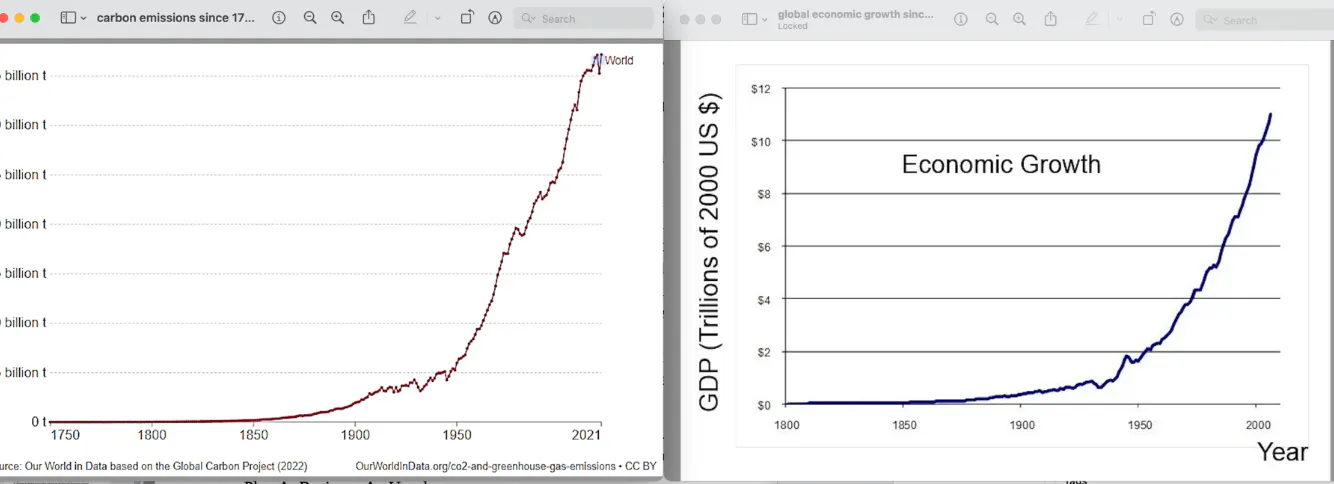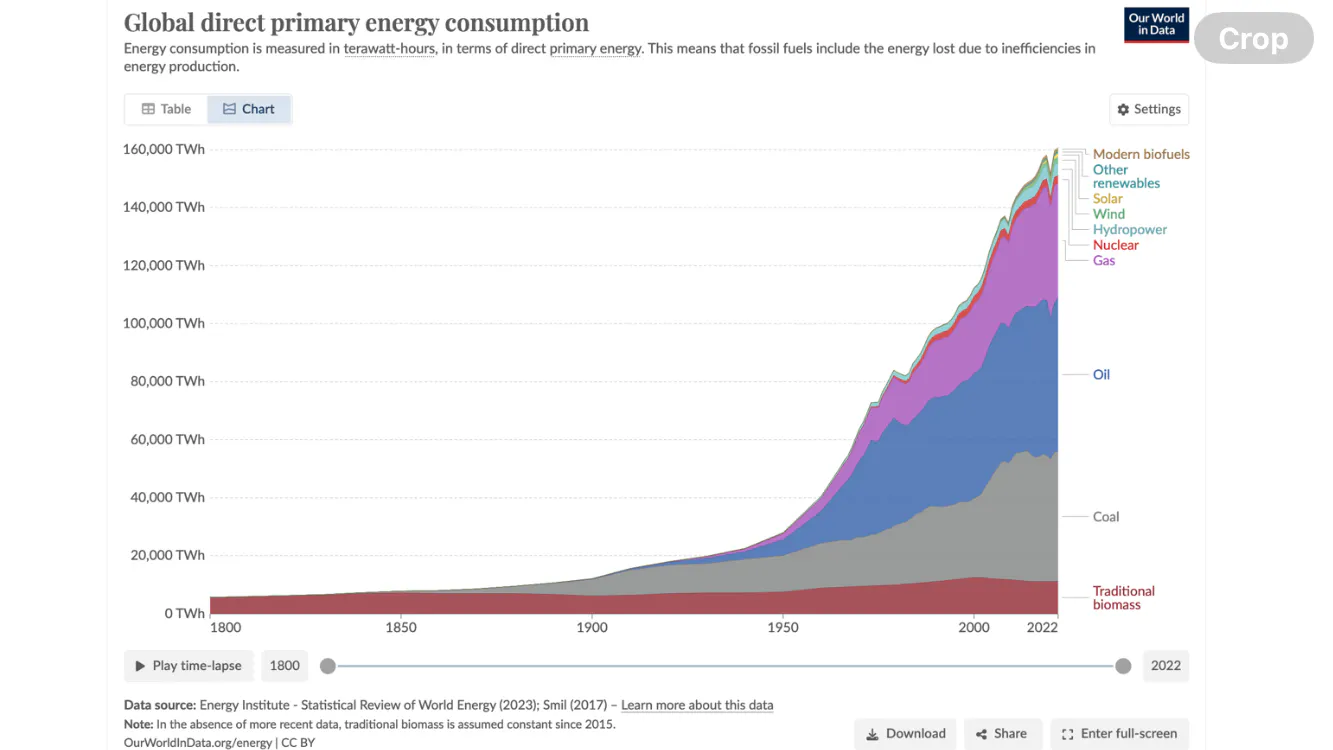The fairy tale of how millions of electric wankpanzers saved the world

(source: ideogram.ai)
Dear friends,
gather round, today, I'll tell you a fairytale.
Fossil capitalism: more growth = more destruction
Once upon a time there was a mode of production whose hitherto unknown productive dynamics, whose unleashing of the forces of production eclipsed all other economic systems because it could produce and sell faster, better and more efficiently than feudalism, slave-owning societies, etc. Once upon a time there was fossil capitalism.
Fossil capitalism emerged in England around 1800 and conquered the world from there. Where previously energy was mainly obtained from biomass, fossil capitalism started by burning coal, from the 1920s onwards more and more oil, and since the 1950s more and more methane, aka known as "natural gas" thanks to a clever marketing trick.
However, this incredible productivity was paid for, among other things, by the destruction of the earth. Since the beginning of the industrial revolution, humanity-on-capitalist-steroids has been heading ever faster towards ecological "overshoot", the point at which we have exceeded so many planetary boundaries (climate, biodiversity, etc.) that industrial society must collapse, which would result in a massive collapse of human populations. In other words, billions would die. Where "growth" (in some regions of the world economy, and under certain circumstances) actually enabled many people to escape absolute poverty in the short and medium term (although it also brought new types of poverty into the world), in the long term and all over the world it would plunge the whole of humanity into catastrophe.

(Charts 1 (Abre numa nova janela) and 2 (Abre numa nova janela): the close relationship between economic growth and greenhouse gas emissions from 1800-2000).
Decoupling: electric capitalism's Prince Charming
In fossil capitalism, as even its environmentally minded partisans concede, there was a close connection between economic activity and environmental destruction: more of one meant more of the other, and this was especially true with regard to the climate, because the central driving force behind this destructive beast was fossil fuels, the burning of which... yadayadayada.
This close coupling, one that within fossil capitalism is of course indissoluble, in turn had to be broken for capitalism to not be revealed as the suicidal death cult it is increasingly becoming, and debate about the possibility of rupturing that connection has been raging for at least 20 years (when in 2005/6 with Hurricane Katrina, the Stern Report and Al Gore's Nobel Prize-winning slide show the climate issue attracted public attention for the third time), but actually for over 50 years, since the publication of Limits to Growth: is decoupling possible within capitalism?
At this point, defenders of capitalism usually present national-level data from the global North, which, so their narrative goes, show that decoupling is possible; the anti-capitalist side usually counters with global data, in which (if you include uncounted methane leakage) no global decoupling dynamics are recognisable (I discuss these issues in the podcast "Wicked Problems (Abre numa nova janela)").
To be honest, though, the historical part of the debate is a bit pointless: the decoupling side has to ignore the fact that the relevant unit of analysis is of course the global economy, and that national-level data is simply not sufficient to support the intellectually quite far-reaching claim they make; while we anti-capitalists can at best say "decoupling hasn't happened yet, so it won't happen", which is probably a logical fallacy.
Tesla and electric capitalism
The really relevant question is not "has it happened thus far?", but rather: “can it happen in the future?” which jumps us straight into a debate that is currently dividing the "left-green" field (“bubbles”) in Germany: The Tesla-debate, especially in the wake of the widely publicised arson attacks (Abre numa nova janela) on their much-hyped “Gigafactory” in Grünheide near Berlin. Are you for or against Tesla, for or against more protests and actions against Tesla? *This* is today's version of the decoupling debate: we're still debating the question of whether electric growth capitalism can solve the problem that fossil growth capitalism has created.
The "protest against the fossil-fuelled German car mafia rather than against a company that at least produces electric cars"-position is based on two arguments: firstly, it is pointed out that Elon Musk and his Gigaego are much more of a nuisance to German car manufacturers (the German climate movement's ultimate enemy), at least symbolically, than the Chinese suppliers, who dominate a larger part of the market. Secondly, it is argued that, ceteris paribus, every e-car sold is better than every ICE-car (internal combustion engine) sold. And therefore, the argument goes, it doesn't make sense for the climate movement to go after Tesla, because, you know: let's rather have Tesla's e-cars than the dirty German combustion engines.
To be sure, car for car this is true. The figures differ here, but after a few tens of thousands of kilometres at the latest, an electric car that runs on renewable electricity is an ecologically better investment than a combustion engine, and the user of the car has no built-in interest in low petrol prices. But this is not about a few individual cars, nor is it about a few factories competing with domestic car manufacturers. It's about building a globally networked production infrastructure that will produce around 330 million e-cars by 2030 (Abre numa nova janela). It is about nothing less than launching a new phase of capitalist development, analogous to fossil capitalism, which replaced the renewable biomass capitalism of the early modern era (and of course within fossil capitalism there were transitions from one form of energy to the next: from coal to oil, and from oil to gas).
Energy systems: on top, not instead

So, the "Tesla question" is not just about a few cars and factories; what's at stake is the future of capitalism, and therefore the world. Can an electric capitalism (or more precisely, an increasingly renewable energy-driven, largely electrified capitalism – what we used to call “green capitalism”, but never repeat enemy frames) replace the old, fossil-fuelled growth model?
The honest answer is: maybe, maybe not, it's really impossible to predict with absolute certainty (because it's about the future, which, you know... hasn't happened yet, and capitalism is nothing if not adaptivee). But even if we could say "yes" with certainty, this would still not solve the climate problem, because: new, more efficient energy systems never replace the old systems, they, as it were, superimpose themselves on them. In new / more efficient / more productive sectors, the new energy will be used, but the majority of the global economy will continue to run on the old energies. More new energy does not mean less old energy, on the contrary.
The above graph demonstrates this quite clearly and impressively. In 2000, 250-200 years after the beginning of the coal-fuelled industrial revolution in England, more energy is produced from biomass worldwide than in early biomass capitalism. When the oil age really took off with the global expansion of Fordist mass production after the end of the Second World War, significantly more coal was burned than at the "official" end of the coal age around, give or take, 1920. The same applies to any new form of energy: its introduction never correlates with a reduction in old forms of energy; in fact, the use of old forms of energy continues to increase, even as the new form of energy becomes more widespread. The new energy system only replaces the old one in very specific, economically "leading" regions and sectors (replaced in the sense of: now oil, where before coal, now gas, where before oil), while the absolute majority of global production takes place with old processes and “old” energy.
If this is applied to the emergence of a possible renewable electric capitalism, it would mean that the new, electric capitalist energy system would use more renewable energies, but would also burn more fossil fuels and traditional biomass. Because in the history of capitalism, the introduction of a new form of energy has never, ever, ever led to less use of any other form of energy. In short: more Teslas in Germany = more fossil fuel production globally, and more electric capitalism = more (now subordinate) fossil fuel capitalism.
_________________
In order to write this blog every week, I could really use your economic support
__________________
Why is that the case? For two reasons: asynchronicity in the global political economy, and "articulation".
When a new form of energy is introduced in one location, that location becomes the epicentre of the new energy system and the new phase of capitalist development that it drives. When England started burning coal to power steam engines, it became the dominant player within emerging fossil, industrial capitalism. Of course, this did not mean that the rest of the world started en masse to burn coal for steam engines. The rest of the world continued to burn biomass and use wind power, in essence working for enrichment of the more productive (and more imperialist) British economy.
The expansion of the new form of energy was thus slowed down by the asynchronicity of the global economy, which meant that its introduction and becoming-dominant, which led to a dynamisation of global capitalism, went hand in hand with the quantitative increase in the use of old forms of energy. The new, dominant energy sector articulated, subjugated, so to speak, the rest of the global energy economy, transforming it in terms of its role in global capitalism, but leaving its technical and social basis largely untouched, or even giving it a friendly growth boost. The old production processes continue to run, but are simply not as efficient and therefore not as profitable as the production processes that run with the new form of energy.
The electric radicalisation of global capitalism
This means that a rapid expansion of e-car production now, at the moment when the climate is basically tipping into "game over" mode, would massively ramp up all production in the world; that every fart of fossil gas would be fracked out of every little hole, that every crumb of lithium would be mined everywhere, that every fossil-fuelled miner, car supplier and every global transport company could no longer save itself from orders.
Anyone calling for an e-car revolution is calling for a radical expansion of global capitalist production, the absolute majority of which (remember: we live in fossil capitalism) would be fossil fuelled. So what is really being "decoupled" here? The end use of one, albeit fairly central, product of the global economy is being electrified, but the rest of the production chain is not. Instead, global production is being massively expanded, and with it the parts where growth is not decoupled from climate destruction (not to mention all the other global environmental crises that have nothing to do with carbon in the narrower sense).
And nobody (except maybe the rich) lived happily ever after.
Yours, in sceptical anticipation,
Tadzio


